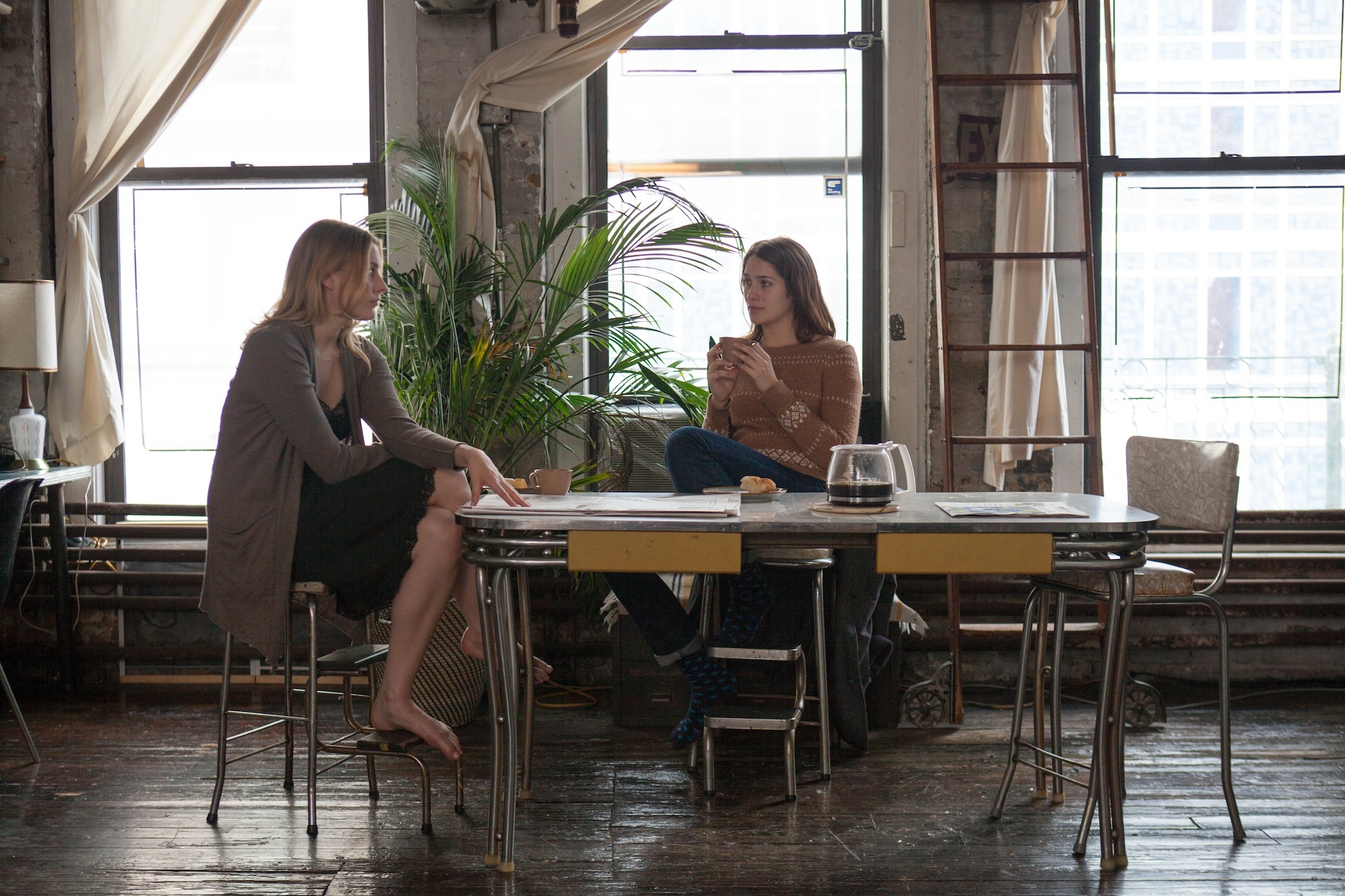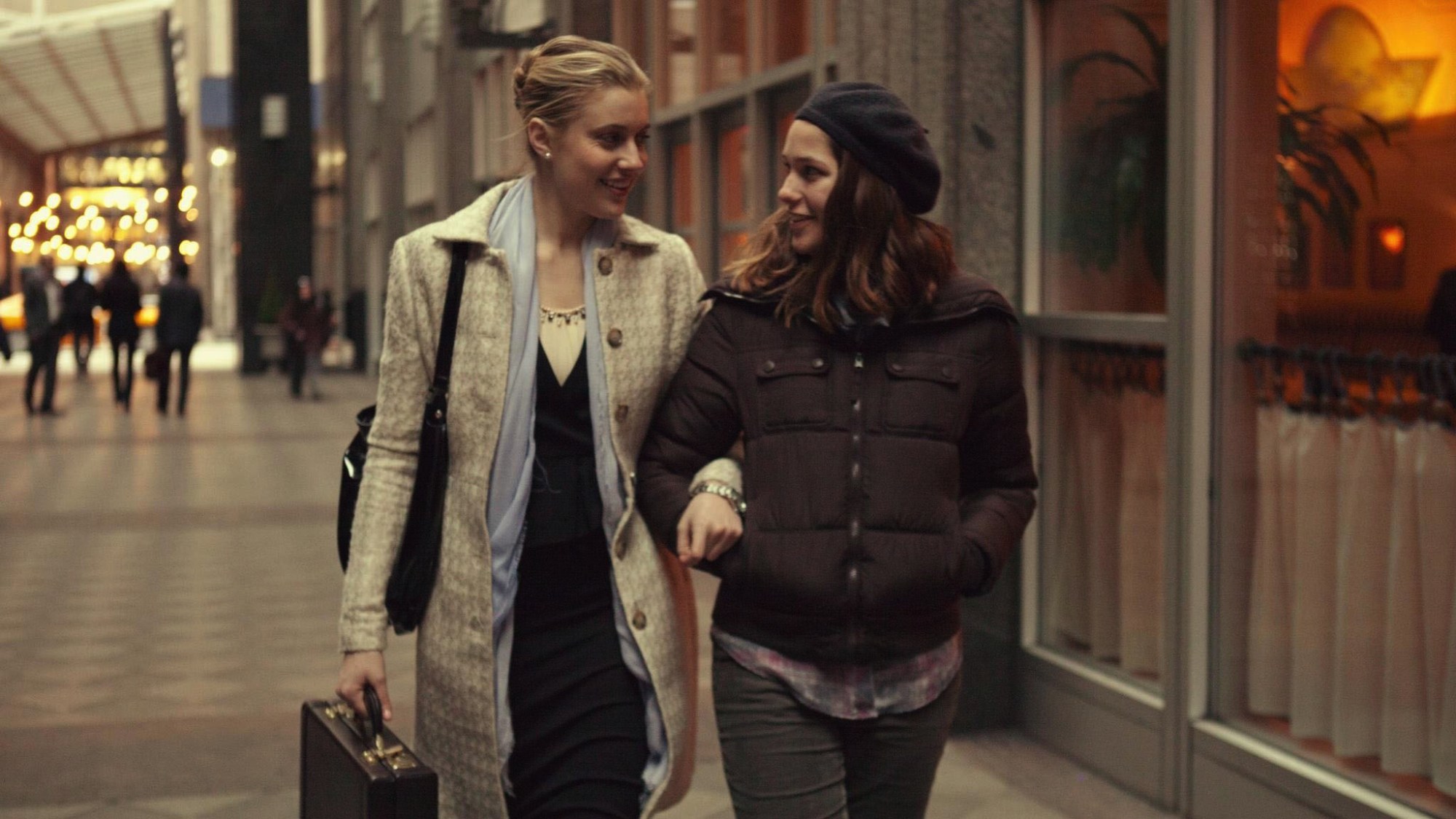Lola Kirke is barefoot. It’s 11 AM at the Crosby Hotel when I spot her galloping through the hallway, the hem of her dress in one hand and a pair of snakeskin heels in the other. She beams and waves to the handful of reporters waiting for the elevator, blissfully unaware (or awesomely DGAF) that she’s doing anything out of the ordinary.
The scene is so in sync with Mistress America, the new movie that Kirke stars in opposite Greta Gerwig (premiering tomorrow at Sundance Next Fest in L.A.), that I wonder for a moment whether it was planned. In the film, directed by Noah Baumbach and co-written by Baumbach and Gerwig, Kirke plays Barnard freshman Tracy, who is swept up in a series of adventures with her 30-something future step-sister Brooke (Gerwig). It’s a platonic love story, but also a film about trying and failing to embody ideals of being young and female in New York. Like Kirke, who arrived at the press conference in heels then decided to remove them, Brooke and Tracy try on and shed various identities—writer, restaurateur, tutor, decorator, sister, friend, seductress, SoulCycle instructor—ultimately revealing characters realer than any of the personas they attempted to conform to.

The title, which is also the name of a superhero TV pilot Brooke plans to write, is an early clue that Mistress America revolves around the drama of trying to become your most ideal self. Like most of Brooke’s ideas—the Williamsburg restaurant, the designer T-shirt company—the pilot is just a plan that never materializes. Tracy, a quiet, insecure college freshman who idolizes Brooke, snags the title for her short story, a pseudo-fictional telling of her friend’s life. Ultimately, Tracy finds the follow-through that evades Brooke, getting her story published in her college’s prestigious literary journal. In the meantime, some of Brooke’s other schemes fall through. She gets dumped by her boyfriend, who also pulls out as a restaurant investor, all while her landlord tries to evict her from her prized commercially-zoned apartment.
The glamorous hot mess is a popular archetype. Shows like Unbreakable and movies like Trainwreck also center on women hustling to “make it” in New York, and the hilarity of watching them fail not just once, but over and over. Failure in this kind of comedy has a feminist bent, even when it falls into conventional traps, like packaging female neurosis as quirky sex appeal, tied with a rom-com bow. Baumbach, meanwhile, who frequently works with his romantic and writing partner Gerwig, is famous for creating messy, complex characters, whose neuroses don’t always find resolution. Brooke is one of them, but her messiness also has a pop-y gloss (she loves Instagram and Twitter, for instance, and appears in dozens of BFA-esque party photos when Tracy Googles her). She’d also be up for shots in a bar with Amy Schumer, for sure.

One theory why this archetype might be having moment is that it’s an antidote to mainstream #LeanIn empowerment narratives. Writing a different story for i-D recently, I came across a quote from artist Audrey Wollen about the current need for new female archetypes: “We’ve really fixated on loving ourselves—there’s this ethos of excess and approval, making it cool and fun to be a girl,” she said. “The problem is: it isn’t really cool and fun to be a girl. It is an experience of brutal alienation and constant fear of violence.” Brooke doesn’t experience any violence directly, yet she is fixated on and alienated by a particular paradigm of female success, embodied by her old friend Mimi Claire. Mimi Claire, who may or may not have stolen Brooke’s T-shirt business idea, fiancé, and cats, lives in a Connecticut mansion, surrounded by the wealth, romance, and stability that Brooke both craves and rejects. “She’s on the end of what was kind of a successful run of dating vapid wealthy men,” Gerwig says of Brooke at the roundtable. “If she had 10 percent less integrity she would have done [it]. We love her more because she has integrity, but god doesn’t she wish she had less.”
Listening to Gerwig, it’s easy to imagine that the actress and writer might be kind of like Brooke (she’s articulate, charming, and kind enough to answer my last question, even after a PR rep insists we’re out of time). Yet Gerwig is careful to note that she and Baumbach wrote the character not based on anyone in real life so much as out of a desire to imagine something new. Part of this was a new female character, their own superheroine. “These women have an edge of danger to them, which we felt like was missing from cinema,” said Gerwig, comparing Brooke to the leads in Bringing Up Baby and Desperately Seeking Susan. “These are hard girls. They’re not easy to digest.”
In the end, failure might actually be better more interesting than success. In the last scene of Mistress America, over Thanksgiving dinner at Veselka, Tracy reflects on Brooke’s originality: “[She] had made rich fat women less fat and rich stupid kids less stupid and lame rich men less lame. And she wanted so badly to be on the other side—to be fat and stupid and lame and rich. But what she couldn’t see most of all… was that those people were nothing compared to her.” In other words, the rich, fat, lame souls of the world might be eating turkey instead of pierogi, and probably don’t go barefoot when their feet hurt. Which is all the more reason to forget them, and watch Mistress America one more time.
Credits
Text Alice Hines
Images courtesy Fox Searchlight Pictures © 2015 Twentieth Century Fox Film Corporation All Rights Reserved
